新概念英语第一册 Lesson 19~20(带答案)(共32张PPT)
文档属性
| 名称 | 新概念英语第一册 Lesson 19~20(带答案)(共32张PPT) | 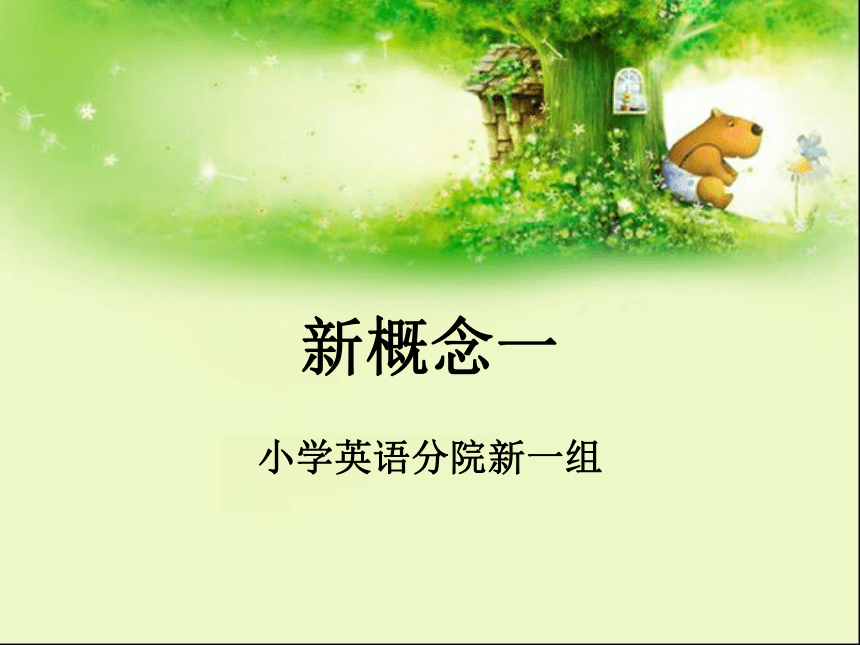 | |
| 格式 | ppt | ||
| 文件大小 | 7.0MB | ||
| 资源类型 | 教案 | ||
| 版本资源 | 新概念英语 | ||
| 科目 | 英语 | ||
| 更新时间 | 2023-12-26 17:32:58 | ||
图片预览

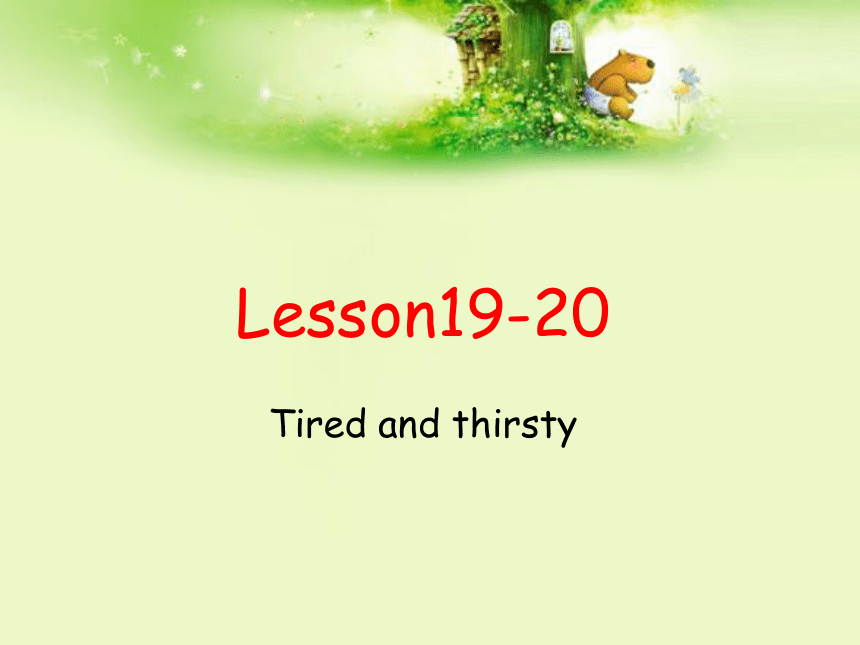
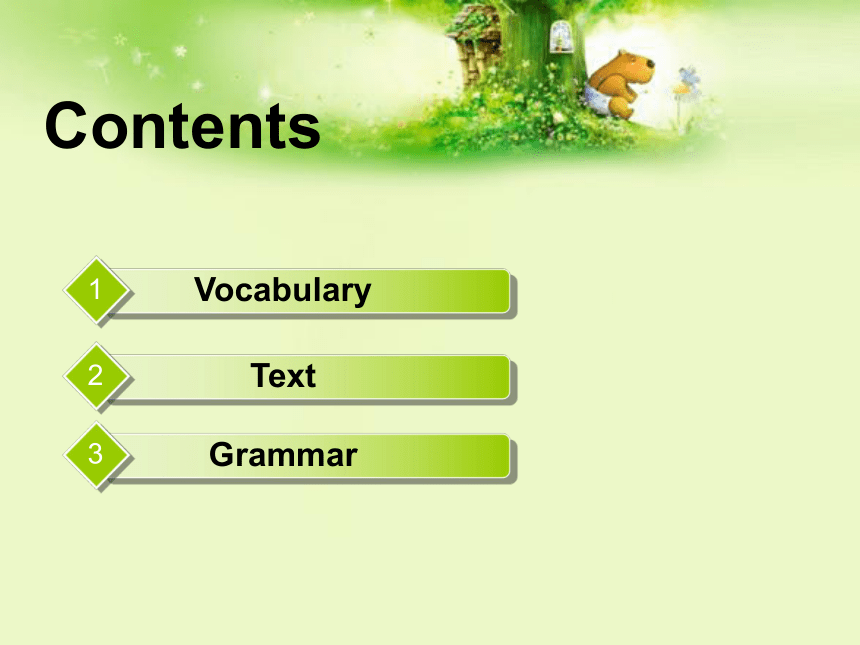
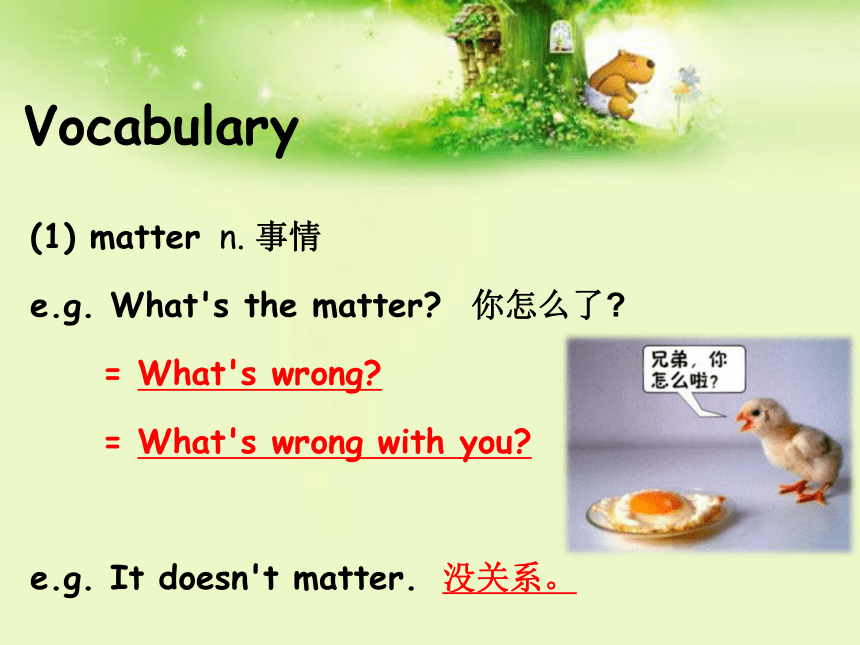
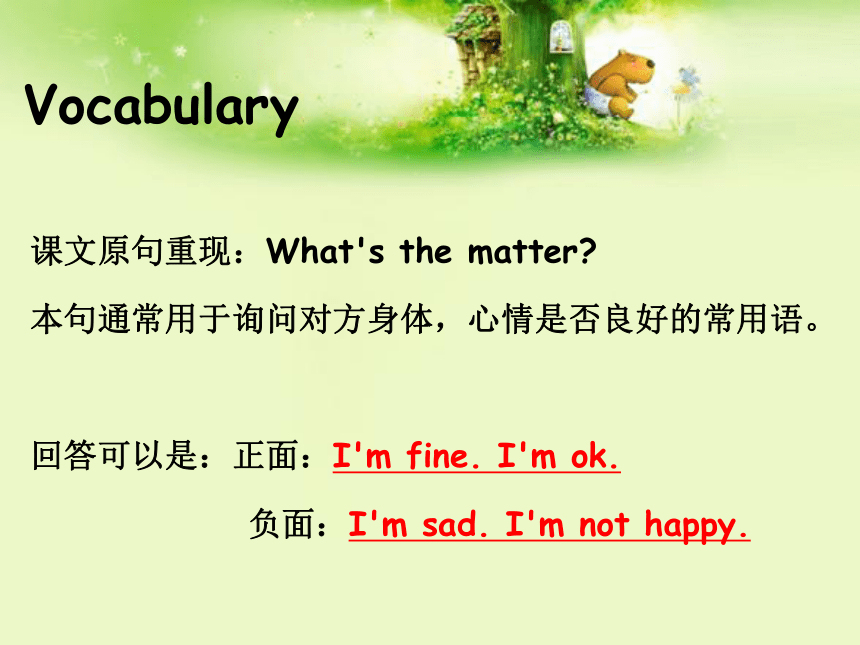
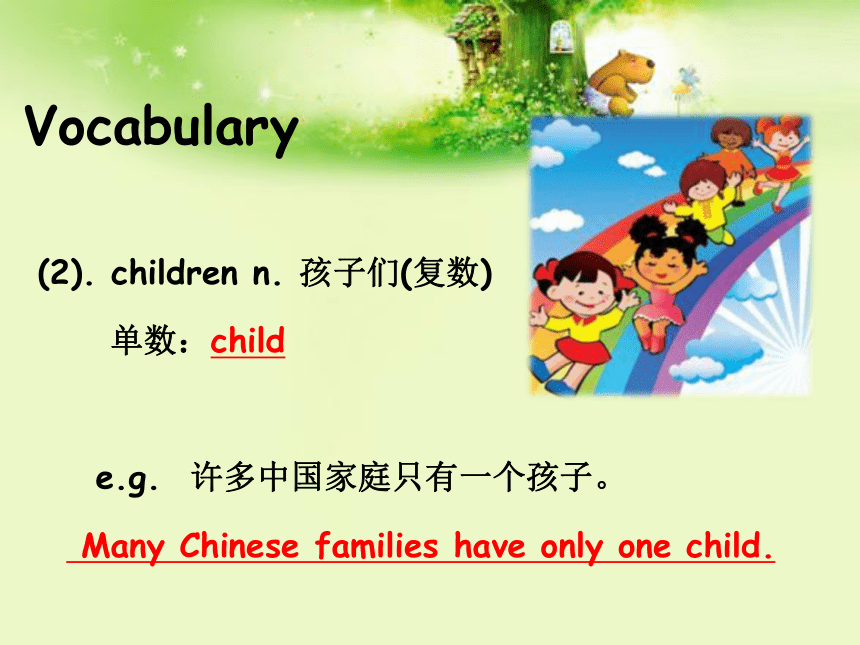
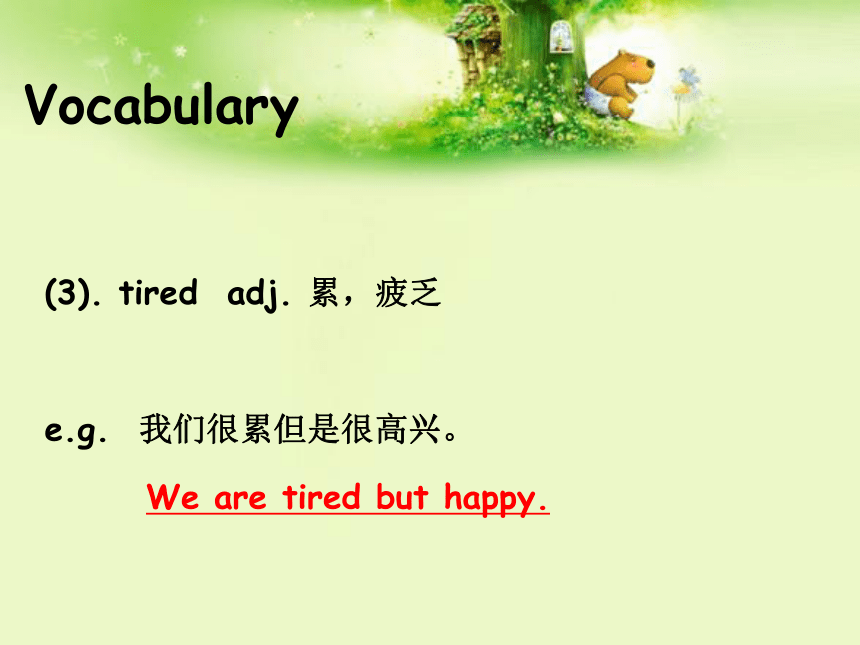
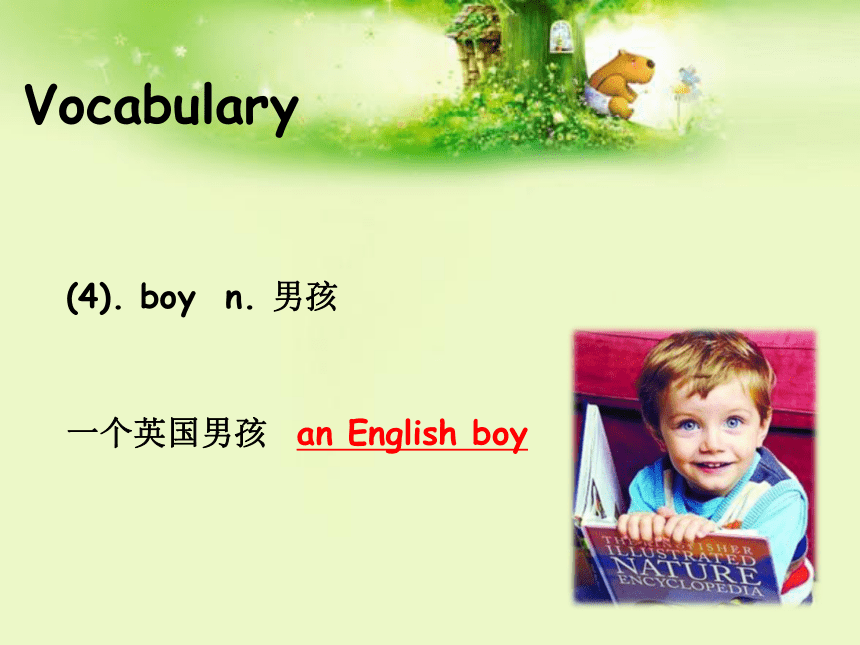
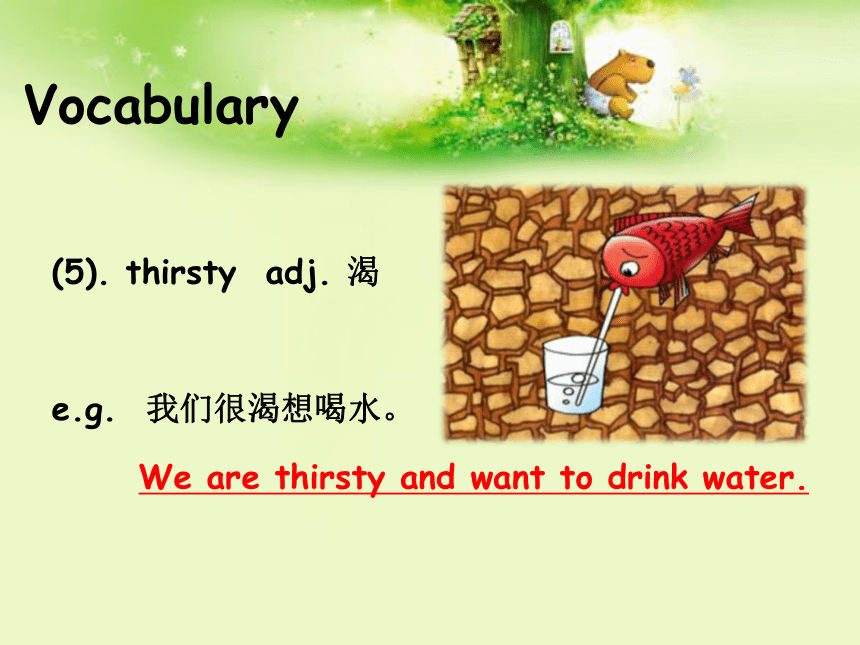
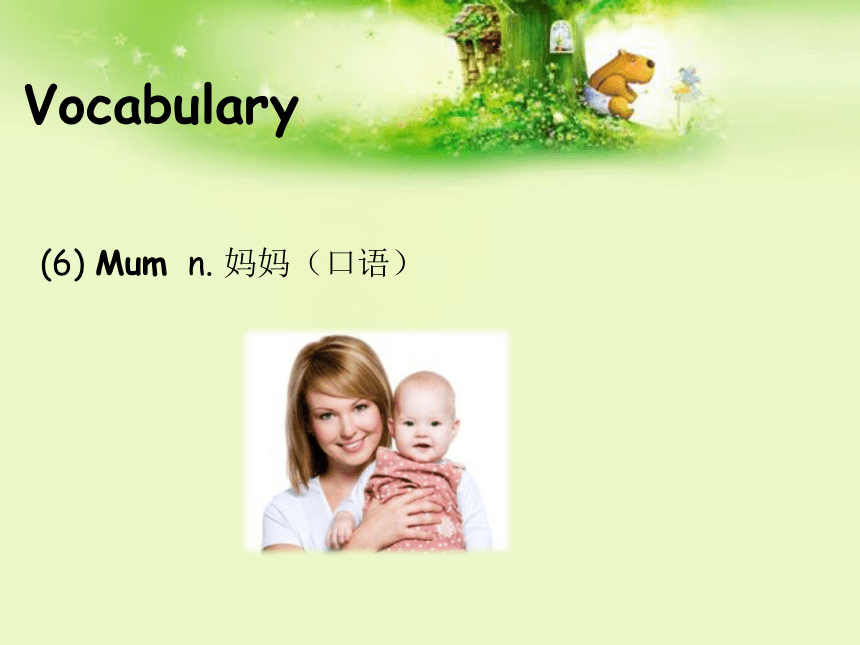
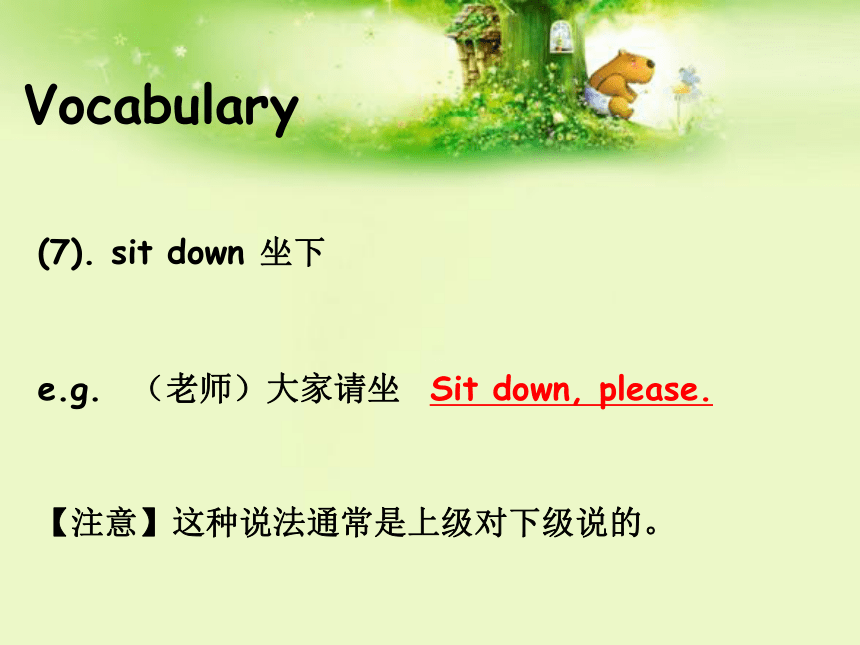
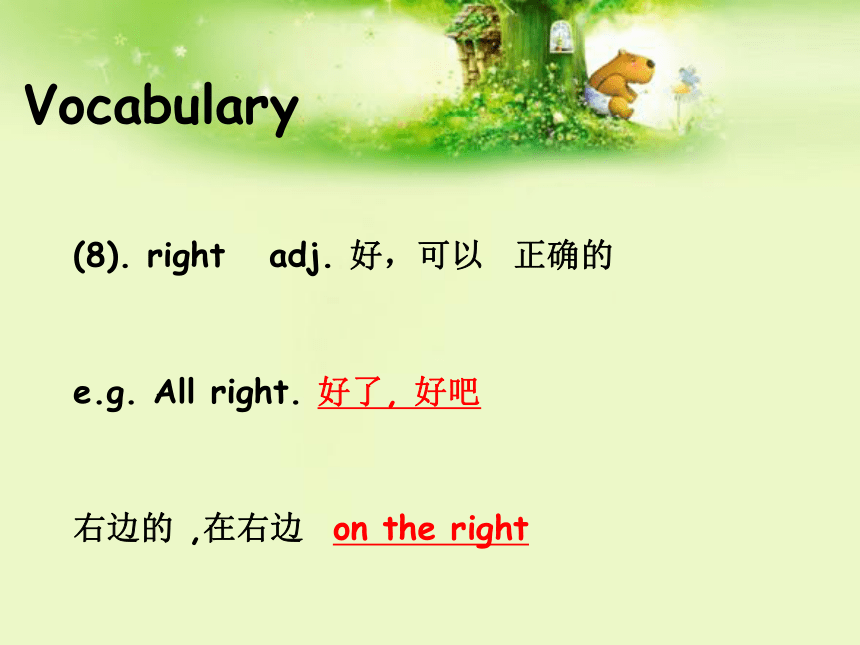
文档简介
(共32张PPT)
新概念一
小学英语分院新一组
Lesson19-20
Tired and thirsty
Contents
Grammar
3
Vocabulary
1
Text
2
matter n. 事情
e.g. What's the matter 你怎么了
= What's wrong
= What's wrong with you
e.g. It doesn't matter. 没关系。
Vocabulary
课文原句重现:What's the matter
本句通常用于询问对方身体,心情是否良好的常用语。
回答可以是:正面:I'm fine. I'm ok.
负面:I'm sad. I'm not happy.
Vocabulary
Vocabulary
(2). children n. 孩子们(复数)
单数:child
e.g. 许多中国家庭只有一个孩子。
Many Chinese families have only one child.
Vocabulary
(3). tired adj. 累,疲乏
e.g. 我们很累但是很高兴。
We are tired but happy.
Vocabulary
(4). boy n. 男孩
一个英国男孩 an English boy
Vocabulary
(5). thirsty adj. 渴
e.g. 我们很渴想喝水。
We are thirsty and want to drink water.
Vocabulary
(6) Mum n. 妈妈(口语)
Vocabulary
(7). sit down 坐下
e.g. (老师)大家请坐 Sit down, please.
【注意】这种说法通常是上级对下级说的。
Vocabulary
(8). right adj. 好,可以 正确的
e.g. All right. 好了, 好吧
右边的 ,在右边 on the right
Vocabulary
(9). ice-cream n. 冰激凌
e.g. 双球冰激凌
Double-ball ice-cream
Vocabulary
(10). big adj. 大的
e.g. 地球是一个大球。
The earth is a big ball.
Vocabulary
(11). small adj. 小的
e.g. 蚂蚁是小小的动物。
Ants are small animals.
Vocabulary
(12). open adj. 开着的
e.g. 门是开着的。The door is open.
v. 开 e.g. 开门 open the door.
反义词:shut adj. 关着的; v.关上
Vocabulary
(13). light adj. 轻的
e.g. 我是小孩,我很轻。I'm a child and light.
n. 光 moonlight 月光
反义词:重的 heavy
Vocabulary
(14). long adj. 长的
e.g. 绳子很长。
The rope is very long.
反义词:短的 short
Vocabulary
(15). shoe n. 鞋子
e.g. 我有一双漂亮的鞋子。
I have a beautiful pair of shoes.
The opposite words
Introduction:
Work in Groups
And the group which named the most opposite words will win.
Game on!
Text: Tired and thirsty
Q: Why do the kids thank their mother
Text
Role Play
记忆面包条
What’s the matter
What’s wrong
看见别人不舒服时,询问:你怎么了?
Here you are.
给你(千万不要说成 give you 哦。)
--好句推荐
Grammar
1. There be 句型I
课文原句重现:There is an ice cream man.
There be +主语+地点,表示“某地有某物或者某人”。
其中,单数名词或者不可数名词用there is ;复数名词用there are。
定义:某地有什么~
结构:There is + _____________ + 地点
+ _____________ + 地点
There are + ____________ + 地点
原则:
可数名词 单数
不可数名词
可数名词 复数
就近原则
1. There be 句型I
(我包里有三本书)_________________,_________________I lend you one.
Thanks! _______________________
(我的桌上有一个苹果) Here you are!
Look,(操场上有很有学生)
_________________________________________
There are three
books in my bag,
There is an apple on my desk
There are many students on the playground.
One by one:
Introduction:
The first student starts with a sentence ”There is/are… on/in…”
The second student has to say “There is/are… on/in…
and there is/are… on/in…
…
Game on!
there be否定形式:直接在be动词后加not.
试一试:将下列句子改为否定句
There is an orange in her bag. →
There isn’t an orange in her bag.
There are many books on the desk. → There aren’t many books on the desk.
2. 选择疑问句I
结构:一般疑问句+or+可选择部分?
e.g. Are these apples red or green
Do you like the white one or the red one
回答:只需要回答这两个选项其中之一即可, 而不是回答yes/no。
所以上述例句可答为:These apples are red.
I like the red one.
Do you like ________or __________
basketball
I like football/basketball.
football
新概念一
小学英语分院新一组
Lesson19-20
Tired and thirsty
Contents
Grammar
3
Vocabulary
1
Text
2
matter n. 事情
e.g. What's the matter 你怎么了
= What's wrong
= What's wrong with you
e.g. It doesn't matter. 没关系。
Vocabulary
课文原句重现:What's the matter
本句通常用于询问对方身体,心情是否良好的常用语。
回答可以是:正面:I'm fine. I'm ok.
负面:I'm sad. I'm not happy.
Vocabulary
Vocabulary
(2). children n. 孩子们(复数)
单数:child
e.g. 许多中国家庭只有一个孩子。
Many Chinese families have only one child.
Vocabulary
(3). tired adj. 累,疲乏
e.g. 我们很累但是很高兴。
We are tired but happy.
Vocabulary
(4). boy n. 男孩
一个英国男孩 an English boy
Vocabulary
(5). thirsty adj. 渴
e.g. 我们很渴想喝水。
We are thirsty and want to drink water.
Vocabulary
(6) Mum n. 妈妈(口语)
Vocabulary
(7). sit down 坐下
e.g. (老师)大家请坐 Sit down, please.
【注意】这种说法通常是上级对下级说的。
Vocabulary
(8). right adj. 好,可以 正确的
e.g. All right. 好了, 好吧
右边的 ,在右边 on the right
Vocabulary
(9). ice-cream n. 冰激凌
e.g. 双球冰激凌
Double-ball ice-cream
Vocabulary
(10). big adj. 大的
e.g. 地球是一个大球。
The earth is a big ball.
Vocabulary
(11). small adj. 小的
e.g. 蚂蚁是小小的动物。
Ants are small animals.
Vocabulary
(12). open adj. 开着的
e.g. 门是开着的。The door is open.
v. 开 e.g. 开门 open the door.
反义词:shut adj. 关着的; v.关上
Vocabulary
(13). light adj. 轻的
e.g. 我是小孩,我很轻。I'm a child and light.
n. 光 moonlight 月光
反义词:重的 heavy
Vocabulary
(14). long adj. 长的
e.g. 绳子很长。
The rope is very long.
反义词:短的 short
Vocabulary
(15). shoe n. 鞋子
e.g. 我有一双漂亮的鞋子。
I have a beautiful pair of shoes.
The opposite words
Introduction:
Work in Groups
And the group which named the most opposite words will win.
Game on!
Text: Tired and thirsty
Q: Why do the kids thank their mother
Text
Role Play
记忆面包条
What’s the matter
What’s wrong
看见别人不舒服时,询问:你怎么了?
Here you are.
给你(千万不要说成 give you 哦。)
--好句推荐
Grammar
1. There be 句型I
课文原句重现:There is an ice cream man.
There be +主语+地点,表示“某地有某物或者某人”。
其中,单数名词或者不可数名词用there is ;复数名词用there are。
定义:某地有什么~
结构:There is + _____________ + 地点
+ _____________ + 地点
There are + ____________ + 地点
原则:
可数名词 单数
不可数名词
可数名词 复数
就近原则
1. There be 句型I
(我包里有三本书)_________________,_________________I lend you one.
Thanks! _______________________
(我的桌上有一个苹果) Here you are!
Look,(操场上有很有学生)
_________________________________________
There are three
books in my bag,
There is an apple on my desk
There are many students on the playground.
One by one:
Introduction:
The first student starts with a sentence ”There is/are… on/in…”
The second student has to say “There is/are… on/in…
and there is/are… on/in…
…
Game on!
there be否定形式:直接在be动词后加not.
试一试:将下列句子改为否定句
There is an orange in her bag. →
There isn’t an orange in her bag.
There are many books on the desk. → There aren’t many books on the desk.
2. 选择疑问句I
结构:一般疑问句+or+可选择部分?
e.g. Are these apples red or green
Do you like the white one or the red one
回答:只需要回答这两个选项其中之一即可, 而不是回答yes/no。
所以上述例句可答为:These apples are red.
I like the red one.
Do you like ________or __________
basketball
I like football/basketball.
football
同课章节目录
